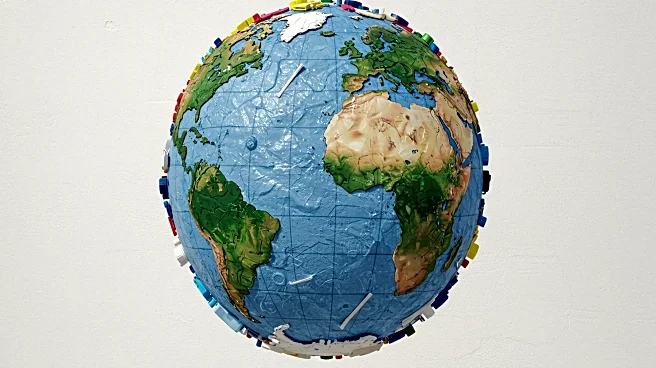What is the story about?
What's Happening?
The United Nations Conference on Trade and Development (UNCTAD) has emphasized the potential economic benefits of a global agreement to tackle plastic pollution. As global plastic production reached 436 million metric tons with a trade value exceeding $1.1 trillion in 2023, plastic now constitutes 5% of total global goods trade. Despite the significant trade volume increase of 48% from 2005 to 2023, 75% of produced plastic becomes waste, much of which pollutes oceans and threatens ecosystems. The disparity in trade policies, with lower tariffs on fossil fuel-based plastics compared to non-plastic alternatives, stifles innovation and slows the transition to sustainable materials. The recent UN Environment Program's Intergovernmental Negotiating Committee session in Geneva failed to produce a legally binding agreement on plastic pollution, highlighting the ongoing challenge of addressing this environmental crisis.
Why It's Important?
The absence of a global agreement on plastic pollution poses significant risks to food security and public health, particularly in small island and coastal countries with limited resources. A well-designed global treaty could align nations around consistent rules for plastic production and usage, potentially creating economic opportunities. The World Wildlife Fund suggests that such a treaty could increase recycled content globally by 77%, expanding sectors like recycling, reuse, and waste management. In the U.S., the plastics value chain could see a 27% job increase. Standardized design requirements could enhance efficiency and reduce public waste management costs, alleviating strain on local budgets.
What's Next?
The failure to reach a binding agreement in Geneva underscores the need for renewed commitment and collaboration among nations. Future negotiations may focus on establishing clear rules for plastic production and usage, potentially unlocking economic opportunities and benefits for micro-, small-, and medium-sized enterprises (MSMEs). These enterprises, which constitute 90% of businesses worldwide, could drive innovation in packaging and alternative materials. However, MSMEs may face challenges such as contracting markets and employment shifts due to new legislation emerging from the plastics treaty.
Beyond the Headlines
The potential global treaty on plastics could have deeper implications for environmental sustainability and economic equity. By addressing the disparities in trade policies and fostering innovation in sustainable materials, the treaty could contribute to long-term environmental health and economic resilience. The role of MSMEs in this transition highlights the importance of inclusive policies that support small businesses in adapting to new market conditions.
















